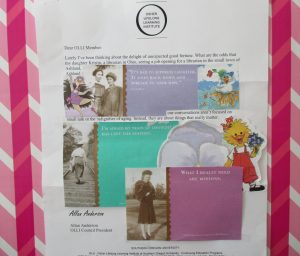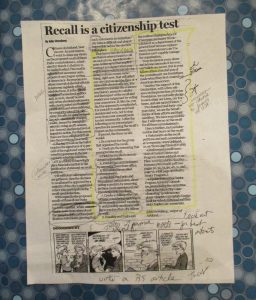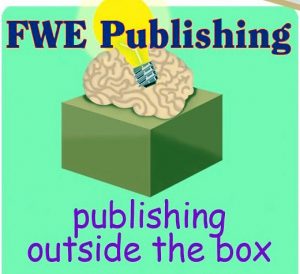presents the
Ashlandia Gazette
All editorial All social commentary All for the common good
T.G. Buckley-Dockter – Founder; Publisher; Editor-in-Chief; Distribution Manager; Intrepid Reporter; IT Guy; Coffee Girl
MOTTO: Presenting our Truth with a capital ‘T.’ Whether it is pretty or not.
Issue Number 13
***********************
Dear Mr. Anderson:
Received your fundraising letter for the Osher Lifelong Learning Institute.

One sentence in particular caught my attention–about your conversations not being about small talk: “Instead they are about things that really matter.”
Like what?
A. Like which is more important: institutional authority or moral authority? Should a ruler’s/leader’s/manager’s ‘rule of law’ supersede the common good of the people?
Too esoteric?
B. Like baseball as a metaphor for life? As the embodiment of the American dream? As the thinking-person’s sport? As an everyday example showcasing the beauty and glory of sports?
Guess you’d have to be a fan.
C. Like the over-use/misuse of the word ‘progressive’ in describing Ashland’s culture? Progressive can mean positive things: forward thinking; dynamic; enlightened; modern. It can even mean revolutionary. I don’t see much ‘progressive’ thinking in Ashland. Do you? I’ve seen more group think/male think/old-way think/not bothering to think mindset. I call it small thinking.
Just because a theater company produces Shakespeare plays doesn’t make it ‘progressive.‘ And certainly not when the executive director of the organization instigates a boycott of a local bookstore over her idiotic response to a banned book display. This thinking was so small-minded it was brainless.
Boycotting a bookstore because of ignorance isn’t progressive. It’s disgraceful. Do you think the executive director would have ordered the boycott if the bookstore proprietor were a man?
A so-called ‘progressive’ community would have been appalled by the boycott and subsequent closure of the bookstore. Instead this travesty received a tepid response from the Ashland community as a whole.
Political commentator/right-wingnut George Will used progressive in the pejorative sense of the word (Washington Post column 1/12/18). He disparaged Oregonians and the law banning self-serve pumping at gas stations.“When Oregonians flinch from a rendezvous with an unattended gas pump, progressive government has done its duty…”
He describes progressive government as one that “wants the governed to become used to having things done for them.” Like the government telling the people this is what you want and don’t want. Like in Ashland, the Parks and Recreation Department telling Seniors, “You don’t want the current high-performing Senior Center. You want the ‘new and improved’ version that’s more costly; may or may not live up to all the hype; and with a totally different, reduced staff that doesn’t know you at all.”
Will quotes Alexis de Tocqueville about the downside of the government telling people what they want: it “can take away from them the trouble of thinking.”
I think de Tocqueville spent time in Ashland.
D. Like the new and improved guidelines for OLLI teachers using provocative course materials in class? Whatever happened to that issue? Last I heard the cirriculum committee was “considering it.”
E. Like the perils of censorship? Personally, I’m against it. No individual or group should have the power to decide what adults should choose to read, watch, listen to, etc. It’s a recipe for tyranny. What do you think?
I like this quote by John F. Kennedy. Do you? “If this nation is to be wise as well as strong, if we are to achieve our destiny, then we need more new ideas…libraries should be open to all–except the censor. We must know all the facts and hear all the alternatives and listen to all the criticism…”
F. Like the difference between criticism and critical thinking? Criticism is what the latest batch of candidates for the open City Council seat offered up to Ashland: Here’s what’s wrong with the City (deficit spending; housing; climate change; homelessness). Critical thinking includes questioning, analysis, judgment, decisions. Identifying a problem is easy. The value is in solving the problem. That’s thinking big.
Did you happen to notice that the guy the City Council voted in was a cookie-cutter version of themselves? Where’s the diversity and opposing viewpoints? No diversity is small thinking.
I like this quote by Harry S. Truman. Do you? “Once a government is committed to the principle of silencing the voice of the opposition, it has only one way to go, and that is down the path of increasingly repressive measures until it becomes a source of terror for all its citizens and creates a country where everyone lives in fear.”
Speaking of fear, reminds me of the letter by Ashland’s Mayor BuBu (Bumbling Bureaucrat) printed in the Daily Tidings about the recall vote for three Parks and Recreation Commissioners.

He said a recall was a “death sentence of electoral politics.” Any opinion on that statement? I think it’s an example of fear-mongering, silencing, ‘progressive’ government (in the George Will sense of the term), and small thinking rolled into one. What do you think? No concern was expressed for the five women who lost a paycheck. No thinking there. Just gender disrespect.
G. Like the “Note” by Jeanne Stallman in the OLLI Spring Catalog?

Wasn’t it terrific? Loved her enthusiasm and independent thinking. She mentioned “creating a life filled with purpose beyond work and family.” That is a bold statement. My favorite line: “…audacity to innovate boldly and create lives of purpose.” WOW–there’s a concept.
To innovate is to make changes to something already established, usually by introducing new ideas, new methods, or new products. This requires thinking different; out-there thinking; original thinking. I call it thinking big.
H. Like have you ever wondered why Etsy.com is so popular (and highly lucrative)? It’s a bunch of home-made stuff crafted by average people. It’s because Etsy fulfills the human necessity of balance: in a high tech vs high touch kind of way. John Naisbitt’s prescient book from 1999 discusses the dark side of technology. He cautions about technology causing confusion about what is real and what is fake.

The gist of the theory is that for humans to be psychologically and physiologically balanced in our modern times, time spent on high tech activities needs to be off-set by an equal dose of high touch time. That’s why being in nature is soothing; unplugging from electronics is rejuvenating; gardening and working with your hands is invigorating. To discount the value of home-made things, including written materials, is small thinking. Naisbitt states: “The two biggest markets in the economy of the United States are: 1. consumer technology; and 2. escape from consumer technology.”
H. Like do you see innovation (as recommended by Jeanne Stallman) or high-touch written materials (as recommended by Naisbitt) at the Ashland Library? I don’t. Ashland is a town that survives and thrives on the written word. Where would the two biggest employers–Southern Oregon University and the Oregon Shakespeare Festival–be without the written word?
Could the library be a place where one could experience local voices? Yes. Does the library encourage locals to share their written words? No.
Why not? Small thinking–the kind that ensures that libraries look and act exactly the same today as they did 50 (or even 100?) years ago (minus the computers). 98% of a library’s content has been dictated by non-local publishing companies with a corporate agenda–telling library patrons this is what they should be reading–as in the the George Will kind of ‘progressive’ government.
The library should reflect the community it is in. Do you think there would be any interest by Ashlanders in what other Ashlanders had to say? You’ll never know unless you try.
Why can’t the library devote a room (too much?), a table (too much?) a shelf (too much?) a corner on the ground in the stairwell to display local talent? What would be the downside? A research librarian didn’t like the opinions expressed and so deemed them “inappropriate?” Complaints from Simon and Schuster?
What would be the reason to squelch this display of creativity? Because it’s never been done before and trying something new is verboten. That’s small thinking. And antiquated.
Because Ashlanders’ written words are not sanctioned, approved, and/or marketed by corporations or have the endorsement by any kind of powers that be? So what. That’s small thinking. And biased.
Because if you let one person’s writing into the library, you’ll have to let everyone’s in? So what. That’s small thinking. And diminishing. IMHO, a Local’s Corner with lots of writing would be a cool thing.
Ashland’s Chamber of Commerce slick magazine brags about the town’s “Creative Culture and Diversity.”

It lists the Oregon Shakespeare Festival, theater, dance, film, and the fine arts. Why not writing? That’s small thinking. And exclusionary.
In an artistic community like Ashland there has to be Writers out there. Why not encourage them–be they poets; short story writers; playwrights; novelists of all genres; memoirists; biographers; historians; non-fiction writers; children’s books writers; screenplay writers; essayists; columnists; comic book writers; journalists; word puzzle writers; etc., and yes, even home-made newspaper publishers. These folks make the world go round. Think about it. What would the world be like with no written word?
Maybe the next Mark Twain, John Steinbeck, or Maya Angelou is living in Ashland–but feels too stifled so moves to a place where the local written word is championed. Maybe the next J.K. Rowling or Ta-Nehisi Coates was thinking of moving to Ashland until they discovered Ashland doesn’t acknowledge its citizens’ creative act of writing.
Ashland could gain a new and realistic label: A Welcoming Place to Writers of All Kinds. As opposed to the phoney statement on page 28: “…Ashland has been enriched over many years with a constant influx of new ideas and creative expression embodying the entire community and threading itself through a willingness to try new things…” Yeesh. What a load of hooey.
Thinking small serves nothing and no one.
Thinking small is narrowing–not broadening. It’s constrictive–not expansive. It does not contribute to a vibrant, evolving, growing community that Ashland claims to be. And it certainly isn’t ‘progressive’ (in the positive sense of the word).
Everyone thinks small from time to time. Like snarky thoughts. Or wussy thoughts. (I find a squirt of Lysol into each ear does the disinfectant trick quite nicely. I buy it by the case.)
Thinking small is easier–a way to get by without having to think more or do more or be more. But the scary part is that if it is practiced long enough it turns someone into a Small Thinker.
No one remembers the Small Thinkers of the world. No one celebrates them because small thinking does not lead to big thinking. And it’s thinking big–accompanied by action (in small, medium, or big steps–or even crawling on your knees or belly)–that gets something accomplished and can make a difference.
Another quote by John F. Kennedy:
“If art is to nourish the roots of our culture, society must set the artist free to follow his/her vision wherever it takes him/her. We must never forget that art is not a form of propaganda; it is a form of truth.”
The first two sentences in your letter mention “delight and unexpected good fortune” that your daughter Kristen is the Manager of the Ashland Branch of the Jackson County Library. Good fortune for you perhaps. But not local writers.
Art should never be censored. Like my newspaper, the Ashlandia Gazette, banned by the Ashland Library. That is small thinking at its itty-bittyness.
Which brings me around to another sentence in your letter, “If you have already given, please feel free to contribute again.”
Censorship means you are not free. I do not feel free to write another check to OLLI, so I’ll pass on your request. However, as far as writing creatively goes: Write On!
Sincerely,
Toni Buckley-Dockter
P.S. I’m looking forward to OLLI’s classes on “Shakespearean Biografiction” (Oxfordian theory–soon to be a fact?) and SOU faculty’s course on “Truth” as the “most challenging issue humans have contemplated through the ages and across culture.” Now that’s ‘progressive!’
###
“If all printers were determined not to print anything until they were sure it would offend nobody, there would be very little printed.” – Benjamin Franklin

